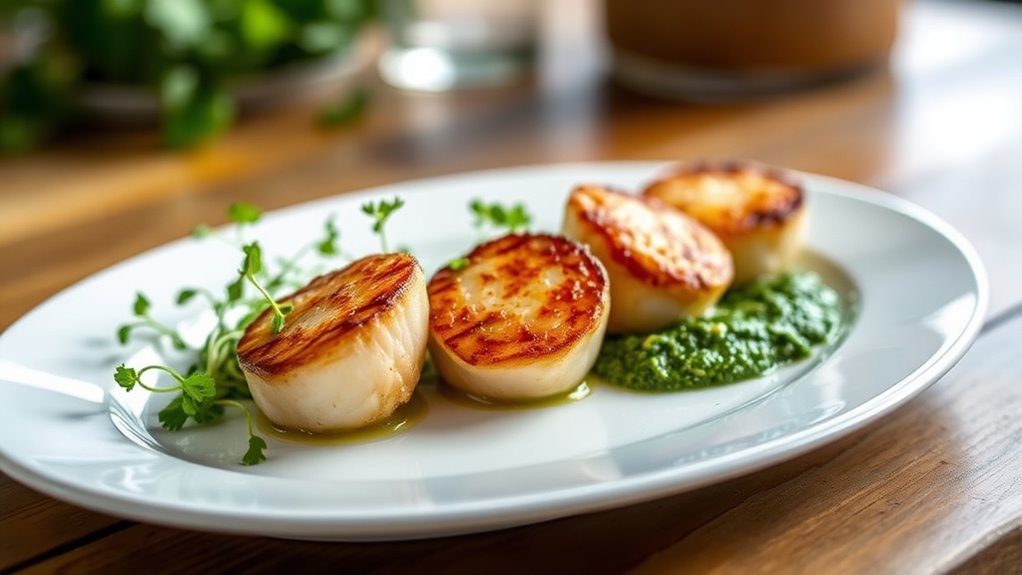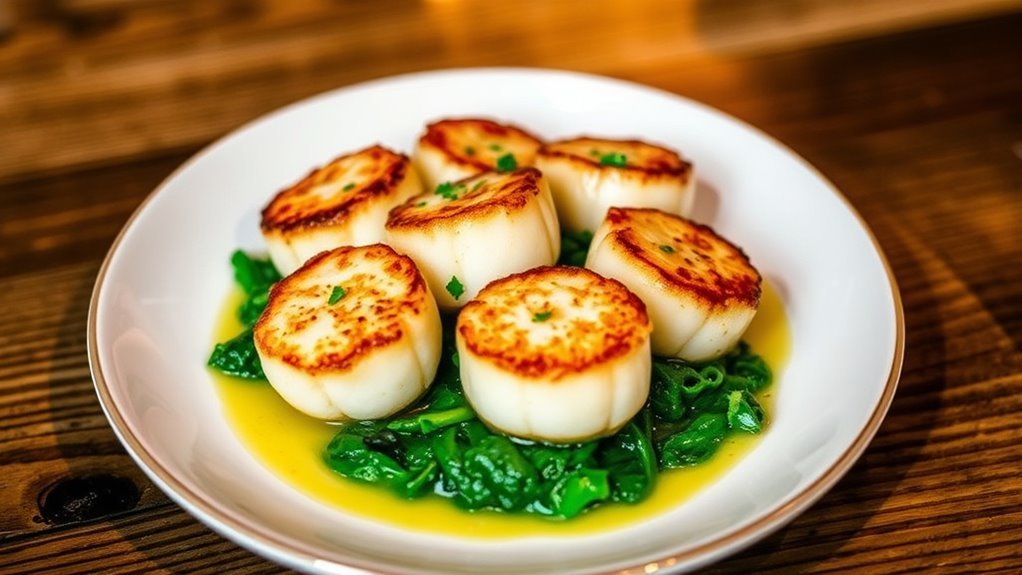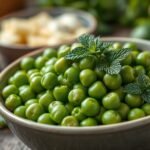Yes, scallops are keto-friendly! They’re low in carbohydrates, containing less than 5 grams per 100 grams, while offering around 20 grams of protein. This nutrient-dense seafood is also low in calories at just 90 calories per 100 grams, making it a great choice for anyone on a keto diet. Additionally, scallops provide essential vitamins and healthy omega-3 fatty acids. If you’re curious about incorporating scallops into your meals, you’ll discover plenty of delicious options ahead!
Nutritional Profile of Scallops

Scallops are a nutrient-dense seafood option that can fit well into a keto diet. Rich in protein, they provide essential amino acids, supporting muscle health while being low in carbohydrates. When considering scallop sustainability, it’s crucial to choose varieties that are responsibly sourced, like farm-raised or wild-caught scallops from certified fisheries. There are several scallop varieties, including sea and bay scallops, each offering unique flavors and textures. Incorporating different types can enhance your culinary experience and nutrient intake. Plus, scallops are packed with vitamins and minerals, such as B12, selenium, and magnesium, making them a wholesome choice. By understanding their nutritional profile and sustainable sourcing, you can enjoy scallops while adhering to a conscious, keto-friendly lifestyle.
Carbohydrate Content in Scallops

With less than 5 grams of carbohydrates per 100 grams, scallops are an excellent choice for those following a keto diet. These delectable seafood options are low in carb content, making them one of the best carbohydrate sources for anyone looking to minimize their intake. Unlike many other protein-rich foods, scallops fit seamlessly into your list of ketogenic foods. Their minimal carbohydrate content allows you to enjoy a flavorful meal without jeopardizing your ketosis. Plus, you can pair scallops with low-carb veggies or healthy fats for a balanced dish. When you’re seeking freedom in your dietary choices, scallops offer the perfect balance of taste and nutrition while keeping your carb count in check. Enjoy them guilt-free on your keto journey!
Health Benefits of Scallops

Scallops are a nutrient-dense protein source, offering essential amino acids while being low in calories. Incorporating them into your diet may also support heart health due to their beneficial nutrient profile. By choosing scallops, you can enjoy a flavorful seafood option that aligns well with a balanced diet.
Nutrient-Dense Protein Source
While many seafood options offer health benefits, scallops stand out as a particularly nutrient-dense protein source. They provide essential amino acids, making them a great choice for muscle repair and overall health. Their rich content in vitamins and minerals contributes greatly to your seafood nutrition.
| Nutrient | Amount per 100g |
|---|---|
| Protein | 20g |
| Omega-3 fatty acids | 0.2g |
| Vitamin B12 | 2.0µg |
| Selenium | 35µg |
| Zinc | 1.0mg |
Choosing scallops also aligns with scallops sustainability, as many harvesting methods are eco-friendly. Incorporating these delicious bivalves into your diet can enhance your nutritional intake while supporting responsible seafood practices.
Low in Calories
At just 90 calories per 100 grams, scallops are an excellent option for those looking to maintain a healthy weight without sacrificing flavor. Their low caloric density allows you to enjoy a generous portion while keeping your calorie intake in check. This makes scallops an ideal choice for anyone practicing portion control, especially on a keto diet where managing macronutrients is essential. By incorporating scallops into your meals, you can indulge in a delicious seafood experience while adhering to your dietary goals. Additionally, their high protein content can help you feel fuller longer, reducing the temptation to overeat. So, if you’re seeking a tasty, low-calorie food that fits seamlessly into your healthy eating plan, scallops are definitely worth considering.
Heart Health Benefits
Incorporating scallops into your diet can offer significant heart health benefits, thanks to their rich nutrient profile. These shellfish are a great source of lean protein and contain essential vitamins and minerals like B12 and selenium, which play a role in maintaining cardiovascular health. Furthermore, scallops are packed with omega-3 fatty acids, known for their anti-inflammatory properties and ability to lower blood pressure. By enjoying scallops regularly, you can harness these omega benefits that support healthy cholesterol levels and improve overall heart function. They’re not just a delicious addition to your meals but also a smart choice for a heart-conscious lifestyle. Embracing scallops can empower you to take charge of your heart health while savoring flavorful dishes.
Scallops and Protein
Scallops are a remarkable source of protein, making them a valuable addition to any keto diet. With various scallop varieties, including sea and bay scallops, you can enjoy a range of flavors and textures while meeting your protein needs. Typically, a 3-ounce serving of scallops provides about 20 grams of protein, which aids in muscle repair and overall health. Their low carbohydrate content aligns perfectly with keto principles, allowing you to savor them without guilt. When considering scallop preparation, methods like grilling or pan-searing can enhance their natural taste, while retaining nutritional benefits. Incorporating scallops into your meals can help you achieve your dietary goals while enjoying a delicious seafood option that’s both satisfying and nutritious.
How to Incorporate Scallops Into a Keto Diet
Incorporating scallops into your keto diet can be both delicious and nutritious. You can explore various scallop recipes that complement keto principles, focusing on low-carb ingredients. Additionally, pairing scallops with appropriate keto-friendly sides can enhance your meal while maintaining the desired macronutrient balance.
Scallop Recipes to Try
Although many people associate seafood with high-carb sides, scallops can be a delicious and versatile addition to a keto diet. You can start with easy scallop appetizers, like searing them in butter with a sprinkle of garlic and herbs. For a flavorful twist, try pairing them with homemade scallop sauces, such as a creamy lemon-dill or a spicy chipotle aioli. These sauces not only enhance the scallops’ natural sweetness but also keep your carb count in check. Another idea is to create scallop skewers, marinated in olive oil and spices, then grilled for a smoky flavor. With these recipes, you can enjoy the freedom of indulging in gourmet meals while adhering to your keto lifestyle.
Pairing With Keto Sides
When you’re looking to enhance your keto meals, pairing scallops with low-carb sides can elevate the dining experience while keeping your carbohydrate intake minimal. Here are three perfect scallop pairings to reflect upon:
- Sautéed Spinach: Rich in nutrients and low in carbs, spinach complements the delicate flavor of scallops beautifully.
- Cauliflower Mash: This creamy alternative to mashed potatoes offers a hearty texture without the extra carbohydrates, making it an ideal side.
- Zucchini Noodles: Spiralized zucchini provides a light, invigorating contrast to scallops, allowing for a satisfying meal without the carbs.
These keto sides not only enhance your scallop dishes but also keep your meals aligned with your dietary goals. Enjoy the freedom to create delicious, healthy options!
Popular Scallop Recipes for Keto
Scallops are not only a delicious seafood option but also a versatile ingredient for those following a keto diet. One popular recipe you might enjoy is scallop tacos, where you can use lettuce wraps instead of traditional tortillas. This keeps the carbs low while letting you savor the delicate flavor of the scallops. Another fantastic option is a scallop salad, combining sautéed scallops with fresh greens, avocado, and a tangy dressing. This dish is not only satisfying but also rich in healthy fats, aligning perfectly with keto principles. Both recipes allow you to explore different flavors while maintaining your dietary goals, proving that eating keto doesn’t have to be boring or restrictive. Enjoy the freedom of creativity in your cooking!
Tips for Buying and Cooking Scallops
Buying and cooking scallops can be straightforward if you keep a few key tips in mind. Here are three essential points to enhance your experience:
- Freshness: Always choose scallops that smell like the ocean, not fishy. Look for a translucent appearance and firm texture.
- Cooking Techniques: Searing is a popular method; it creates a delicious crust while keeping the inside tender. Avoid overcooking, as scallops become rubbery.
- Scallop Storage: Store scallops in the coldest part of your fridge if you’re not cooking them right away. For longer storage, freeze them in an airtight container to maintain quality.
Frequently Asked Questions
Can Scallops Be Included in a Vegetarian Keto Diet?
Scallops can’t be included in a vegetarian keto diet, as they’re seafood. But don’t worry; you’ve got plenty of keto alternatives! Consider vegetarian protein sources like tofu, tempeh, or seitan, which can help you meet your nutritional needs while staying within your dietary restrictions. Combining these with low-carb vegetables can create delicious meals that fit your lifestyle. Embrace the freedom to explore new flavors while staying true to your vegetarian keto journey!
Are Frozen Scallops Just as Healthy as Fresh Ones?
Yes, frozen scallops can be just as healthy as fresh scallops. The freezing process preserves their nutrients, flavor, and texture, making them a convenient option. However, the quality can depend on how they’re frozen and stored. If you choose high-quality frozen scallops, you won’t miss out on the health benefits. Just make sure they’re properly thawed and cooked to enjoy their full potential. So, don’t hesitate to include them in your meals!
Do Scallops Contain Any Hidden Sugars?
Scallops don’t contain hidden sugars; their nutrition primarily consists of protein and healthy fats. In fact, scallop nutrition is quite beneficial, offering essential vitamins and minerals without added sugars. When considering seafood alternatives, scallops stand out due to their low carbohydrate content. If you’re looking to maintain a balanced diet, they’re a great choice, providing delicious flavor without the risk of hidden sugars. Enjoy scallops confidently as part of your meal plan!
How Do Scallops Affect Cholesterol Levels on a Keto Diet?
Scallops can positively affect cholesterol levels on a keto diet. They’re low in saturated fat and rich in omega-3 fatty acids, which may improve your cholesterol profile by raising HDL (good cholesterol) while lowering LDL (bad cholesterol). The keto benefits of scallops include providing a lean protein source that’s nutrient-dense, helping you maintain energy levels without spiking your cholesterol adversely. So, including scallops in moderation can be heart-healthy in your keto journey.
Can Scallops Be Eaten Raw on a Keto Diet?
Yes, you can eat raw scallops on a keto diet, but safety’s essential. Around 80% of seafood-borne illnesses stem from raw consumption. That said, raw scallops can be enjoyed if they’re fresh and sourced from reputable suppliers. The keto diet benefits from their low carb content and high protein, supporting muscle maintenance. Just make sure you’re aware of raw scallops safety to enjoy them without health risks. Stay informed and enjoy your meals!
Frequently Asked Questions about Scallops and the Keto Diet
1. Are scallops considered keto-friendly?
Yes, scallops are considered keto-friendly. They are low in carbohydrates and high in protein, making them an excellent choice for those following a ketogenic diet. A typical serving of scallops contains about 5 grams of carbs, which fits well within the daily carb limit for keto dieters.
2. What nutritional benefits do scallops offer?
Scallops are rich in essential nutrients, including protein, vitamin B12, and omega-3 fatty acids. They are also low in calories and fat, making them a healthy seafood option. The amino acids found in scallops can help support muscle growth and maintenance, which is beneficial for those on a keto diet.
3. How should scallops be prepared for a keto diet?
For a keto diet, scallops can be prepared in various ways that enhance their flavor while keeping them low in carbs. Grilling, searing, or baking scallops with keto-friendly ingredients like olive oil, butter, or garlic are great options. Avoid breading or heavy sauces that may add unnecessary carbohydrates.
4. Can I include scallops in my meal prep for the keto diet?
Absolutely! Scallops can be a versatile ingredient in your meal prep. They can be cooked ahead of time and stored in the refrigerator for a few days. Pair them with low-carb vegetables like zucchini or asparagus for a complete meal that fits the keto guidelines.
5. Are there any potential downsides to eating scallops on a keto diet?
While scallops are generally healthy, it’s important to consume them in moderation due to their cholesterol content. Some individuals may need to monitor their cholesterol levels closely. Additionally, ensure that you source scallops from reputable suppliers to avoid any issues with freshness or quality.
References
- https://www.healthline.com/nutrition/keto-seafood
- https://www.ncbi.nlm.nih.gov/pmc/articles/PMC6342006/
- https://www.wisewell.com/blogs/water-education/scallops-keto-friendly
- https://www.sciencedirect.com/science/article/pii/S2212267217300142
- https://www.eatright.org/food/nutrition/dietary-guidelines-and-myplate/how-to-include-seafood-in-a-healthy-diet
- https://www.mayoclinic.org/healthy-lifestyle/nutrition-and-healthy-eating/in-depth/healthy-eating/art-20045425
- https://www.ketogenic.com/guide-to-keto-friendly-seafood/


